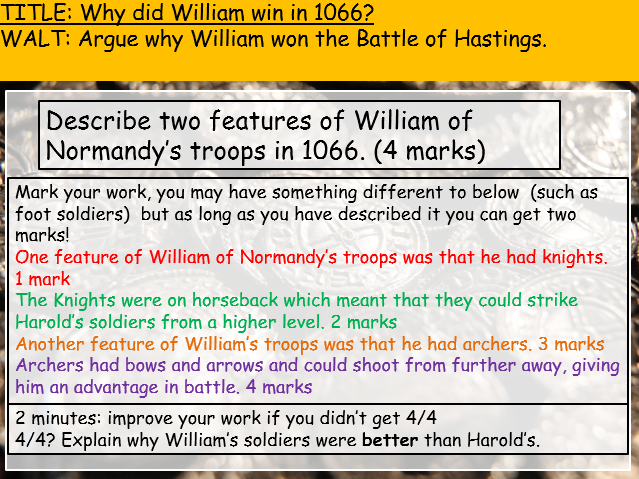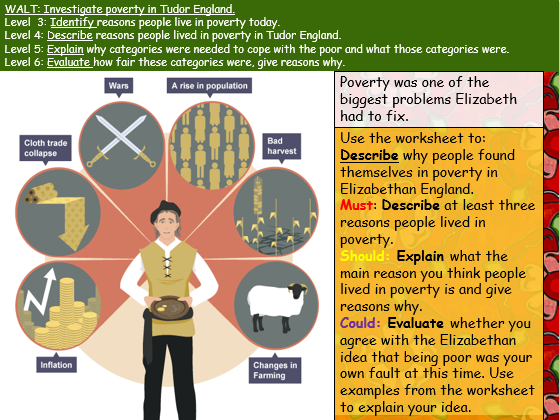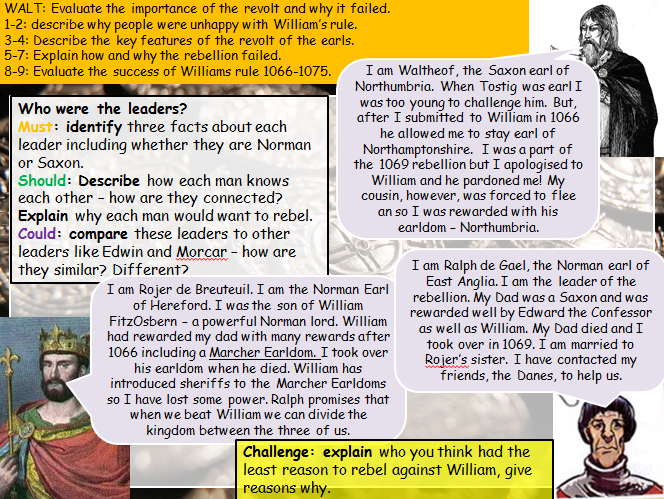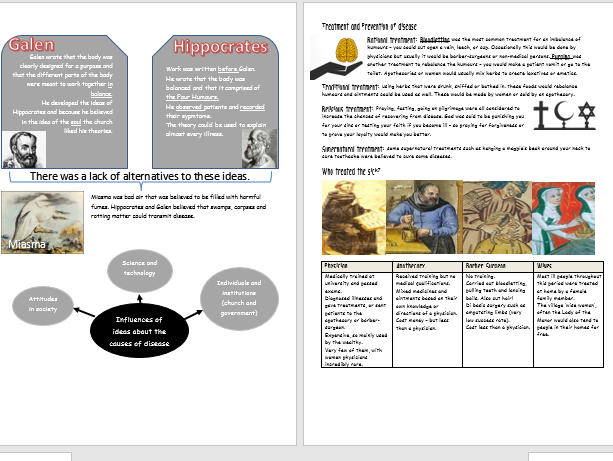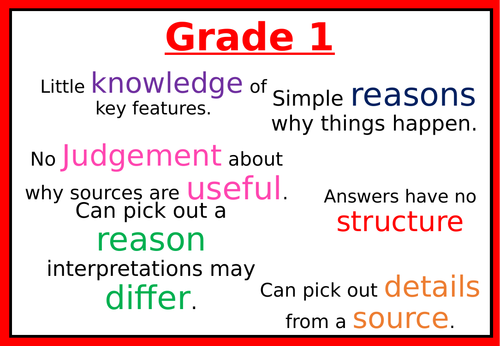
177Uploads
76k+Views
24k+Downloads
History

Pointless - Medicine Through Time
Designed to cover all units of medicine through time as a last lesson of term activity.

Cattle Industry Decline (American West (Edexcel history 9-1))
Lesson that explores the consequences of the end of the cattle industry.
Includes differentiated carousel and exam question (two consequences of…)

Votes for Women! Suffragists and Suffragette’s interpretation lesson
stand alone lesson to celebrate the centenary of votes for women and to provide pupils with an overview of the subject.
Pupils describe the two groups (suffragists and suffragettes) and will gain an understanding of the words militant and moderate. Pupils will also be able to explain why women were not allowed the vote and eventually gained the vote following WW1.
Skills building section develops pupils ability to analyse interpretations.

Norman Conquest (Edexcel history 9-1) Why did William win the Battle of Hastings?
Fully differentiated lesson with 'how far do you agree' exam question and skills work at the end of the lesson.
Pupils colour code the reasons William/Harold's tactics were better, they then analyse their leadership before considering whether it was luck/God's will that led to William winning the Battle of Hasting's.

Wounded Knee and Ghost Dance (American West (Edexcel history 9-1))
Whole lesson covers the ghost dance and the massacre at wounded knee.
Lesson fully differentiated with the opportunity for discussion as to why the Ghost dance would terrify white settlers and how they reacted to the massacre.

REVISION Plots against Elizabeth and Spanish Armada (Edexcel 9-1: Early Elizabethan England)
In this session pupils will cover:
who challenged Elizabeth and why?
Revolt of the Northern Earls
Ridolfi Plot
Throckmorton and Babington
Spanish Armada: causes, conduct consequences
Narrative account practice

Consequence and Importance skills lesson (American West Edexcel 9-1)
aim: consolidate knowledge of key principles and build consequence and importance of skills
Starter: Match the event with the consequences on the worksheet
Pupils have a worksheet with two consequences for each significant event in the unit
establish the difference between consequence and importance
Colour code consequences into importance question types (key themes like destruction of Indian culture and Settlement of the west)
attempt an importance of question as a class
create a question using question stems and answer it themselves.
Bundle

American West Revision Bundle (designed for Edexcel 9-1)
7 revision sessions focused around building skills towards the new GCSE content - narrative account, importance and consequences.

Hereward the Wake and the rebellion at Ely (Anglo-Saxon and Norman England (Edexcel 9-1))
WALT: Explain what caused the Ely rebellion and why it failed.
1-2: recall and describe key features of previous rebellions studied.
3-4: Describe the role of Hereward the Wake in the Ely rebellion.
5-7: Explain the causes, main developments and consequences of the Ely rebellion.
8-9: Evaluate how and why the Ely rebellion failed.
Pupils will:
starter: complete choice of two exam questions, green pen and improve/attempt other exam question if full marks.
discussion: why the fens at Ely? link back to Gate Fulford.
Worksheet task: explain key features of the rebellion, link back to 1068 and 1069 rebellions
Explain task: why did the rebellion fail?
exam question: how far did you agree, exam plan and sentence starters.

Elizabethan England: Poverty and the Poor Laws
WALT: Investigate poverty in Tudor England.
Level 3: Identify reasons people live in poverty today.
Level 4: Describe reasons people lived in poverty in Tudor England.
Level 5: Explain why categories were needed to cope with the poor and what those categories were.
Level 6: Evaluate how fair these categories were, give reasons why.

Medicine Through Time key words (Edexcel 9-1)
Three page document of key words for the Medicine through time unit and the historic environment (Medicine on the Western Front).
I used the pearson textbook and went through cover to cover to produce a document of all key words to support pupils with the content prior to examination.

Revolt of the Earls 1075 (Anglo-Saxon and Norman England (Edexcel 9-1))
WALT: Evaluate the importance of the revolt and why it failed.
1-2: describe why people were unhappy with William’s rule.
3-4: Describe the key features of the revolt of the earls.
5-7: Explain how and why the rebellion failed.
8-9: Evaluate the success of Williams rule 1066-1075.

The Rising Against Tostig Godwinson (Anglo-Saxon and Norman England (Edexcel 9-1))
WALT: Evaluate the reasons and response to the rebellion against Tostig.
2-3: Recall key facts about the role of an earl.
4-5: Describe reasons Saxons did not like Tostig.
6-7: Explain why factors would make somebody rebel.
8-9*: evaluate whether Harold was right to exile his brother.
Pupils will recall the roles of an earl for the starter.
They will then go through each of the reasons the Saxons hated Tostig (printable handout that pupils highlight and annotate)
They write a letter to Harold (LA) or a response from Harold (HA) explaining why they are upset/ how they are going to offer help
They analyse the impact this had upon Harold’s claim and whether he was right to exile his brother.

'What is history?' introductory lesson (What is History? (KS3))
The first lesson in a scheme of work designed to introduce KS3 pupils to the concept of history and help them acquire historical skills.
WALT: identify key historical skills and explain why history is important.
L3: Define what the study of history is.
L4: Describe key skills a good historian needs.
L5: Explain why history is important.
L6: compare history to another subject and justify which you think is most important.
Pupils define what history is in their own words.
Investigation of blooms words, describe, explain, infer etc.
Discussion of what history is, prior learning and a video.
Lesson includes homework for pupils to complete, teacher can use homework to gain a baseline of pupils ability.

WW1 REVISION: Gas! (EDEXCEL 9-1: Western Front MTT)
WALT Analyse sources to explain how gas was used during WW1.
Recall key features of the main battles of WW1.
Identify key features of the first use of mustard gas.
Describe the three types of gas used in WW1 in detail. Explain how they harmed a soldier.
Apply: Analyse sources to evaluate their utility.
The first task recaps the main features of battles in WW1. the main body of the lesson revises key knowledge of gas attacks, before focusing keenly on source skills using the IS-SAYS-KNOW structure and modelling the answer to the first source as a group.

Were the slaves really free after the Emancipation Proclamation?
To follow American abolition lesson.
Differentiated carousel task that considers the positive and negative developments that faced freedmen following the E.P:
Jim Crow, Black Codes, etc.
Carousel hidden slides to print
Full lesson, build up towards a how far do you agree question.

Medicine Through Time Revision Activity Book (designed for Edexcel 9-1)
Revision booklet with:
Knowledge checker (RAG rated)
input of knowledge for each section laid out appealingly
tasks at the end of teach unit - 10 ideas of how pupils can revise, four key words to define and a quick quiz (answers in the back)
source (strengths and weaknesses) table at the back of the booklet

Submission of the Earls 1066 - Normans (Edexcel history 9-1)
Whole lesson, fully differentiated with worksheets.
The final task asks pupils to compare answers against success criteria to mark and then improve two weak 16 mark answers,

Grade Descriptors Edexcel History Display
Display created to inform pupils what is required for the new specification. goes from 1-9, I used the specification grade boundaries to create this display, the wording for g8-9 was identical which is why this grade boundary has one page rather than two.

Elizabethan England: Who was Elizabeth I?
Introductory lesson aimed at KS3 that builds GCSE skills of describe two features and how useful.
Lesson is fully differentiated with worksheets within the powerpoint as hidden slides.
Pupils green pen exam responses to develop understanding of what good writing looks like, pupils are given the opportunity to work up to a level 6 and all tasks are signposted and fully differentiated to support pupils to make good progress.
Task one: Describe what England was like in 1588 (describe two features exam question)
Task two: Explain why people would like/dislike Elizabeth
Task three: How useful are portraits of Elizabeth to a historian?




